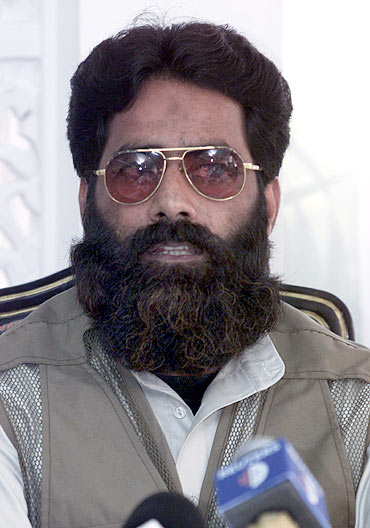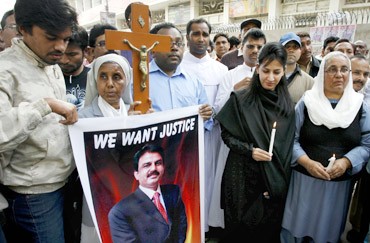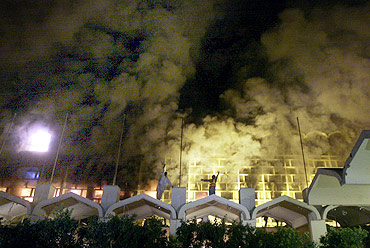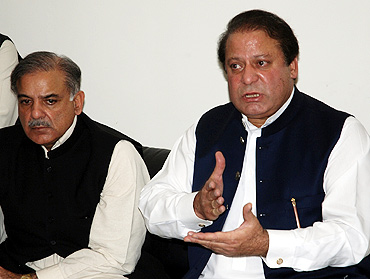This article was first published 14 years ago
Home »
News » Pakistan: Punjabi Taliban rears its ugly head
Pakistan: Punjabi Taliban rears its ugly head
Last updated on: March 9, 2011 14:52 IST
Image: Nawaz Sharif (right), with his brother Shahbaz Sharif, at a press conference in Lahore
Photographs: Reuters
Bomb blasts and violence have become a daily feature in Pakistani life during recent times. The rising trend of religious fundamentalism has led to the mushrooming of a plethora of terror groups, says Tahir Ali.Chief Minster Pakistani Punjab Shahbaz Sharif has continuously denied the influence of terrorists in his province but it is a fact that Punjab is home to a mix of sectarian terrorists groups.
The Punjab province houses the greatest concentration of hard-line madrassas that provide a steady supply young recruits to jihadist groups all around Pakistan.
Terrorists groups like the Lashkar-e-Tayiba, Lashkar-e-Jhangvi, Amjad Farooqi group, Jaish-e-Muhammad, Asian Tigers and the 313 Brigade are run by Punjabi terrorists. The Punjabi Taliban also have a very strong influence over the Tehrike-Taliban Pakistan and other Pashtoon terror froups operating in Khyber Pakhtunkhwa (KPK) and the lawless tribal belts.
Earlier Punjab itself was safe from terror, but now terrorists violence has rapidly becoming a common feature of the province.
In a fresh incident of violence on Tuesday, a massive bomb blast at a gas station in Faisalabad, a city in central Punjab left 21 people dead and wounded 105. It is another wake up call for the chief minister, who the assasination of Minorities Minister Shahbaz Bhatti had warned Pakistani Interior Minister Rehman Malik not to indulge in 'hate mongering' by fanning provincialism.
Actually, Malik had earlier said that Shahbaz Bhatti's killers were from Punjab. CM Sharif expressed his displeasure over the term 'Punjabi Taliban' used by Rehman Malik in the federal cabinet.

Image: Ilyas Kashmiri, leader of Harkat-ul-Jehad Islami
Photographs: Reuters
Talking to
rediff.com, political commentator Dr Ayesha Siddiqa said, "In south Punjab, the terrorists are in a very strong position; they freely roam about the area without being disturbed. There is a strong need for an operation -- not military but it should be a police operation with the help of local intelligence. However, such an operation cannot take place, as these militants enjoy strong backing of the government."
Dr Siddiqa says that Punjab CM has an agreement with the Lashkar-e-Jhangvi and that is the reason for his outbursts whenever someone talks about the 'Punjabi Taliban'.
"He has already entered into an agreement with the LeJ during 2008 elections when the banned outfit fielded a candidate against him, who later withdrew in Shahbaz's favour. How can the Punjab CM allow someone to name the 'Punjabi Taliban', the offshoots of LeJ, as perpetrators of violence?" she asked.

Image: Christians hold a cross and a poster of slain Minister for Minorities Shahbaz Bhatti, during a protest in Hyderabad to condemn his assassination
Photographs: Akram Shahid/Reuters
Senior journalist Rahimullah Yousafzai says, "Shahbaz Sharif is right to say that the words 'Punjabi Taliban' should not be used, as in Waziristan all those people that don't speak Pashto, are called Punjabi. There are Seraikis, Baloch speakers, Urdu speakers, Hindko speakers and Sindhi speakers associated with Taliban, so it is unjust to call all those non-Pashtoon terrorists as Punjabi."
Yousafzai does not agree with the idea that there is any difference regarding the treatment of terrorists representing different ethnic groupers. "All anti-state elements are treated the same; Pakistan is not taking Punjabi Taliban on the way they take Pashtoon militants in tribal areas; In tribal areas Taliban activities are visible while in Punjab they are scattered and live secretly," he told rediff.com.
Image: Pakistani madrassa students hold placards to protest against Israeli occupation of Palestinian areas
Photographs: Mian Khursheed/Reuters
Whether Punjabi Taliban live in small groups or individually it is fact that they are responsible for all the activities especially when it takes place outside Khyber Pakhtunkhwa province. They were behind was Marriott Hotel blast in Islamabad, the attack on the military head quarters in Rawalpindi or the attack on the Sri Lankan team in Lahore.
Apart from the human toll, the Punjabi Taliban have also suceeded in killing cricket in Pakistan, as international players have refused to tour Pakistan after the attack on the Sri Lankan team.
In Punjab, the southern belt is the center of terrorism. Southern Punjab which stretches from Jhang to Bahawalpur is full of Madrassas, which are run with the funds from the Gulf.
In Dera Ghazi Khan, there are 185 registered madrassas out of which around a hundred belong to the hardcore Deobandi sect and six belong to the Ahle Hadith, a school of thought that Hafiz Saeed the founder of the Lashkar-e-Tayiba also follows. There are also a number of such madrassas in Multan, Rahimyar Khan and Bahawalpur as well.

Image: Rescue workers gesture from the top of the lobby of the Marriot hotel after a suicide attack, in Islamabad
Photographs: Faisal Mahmood/Reuters
Renowned writer, Selig Harrison says, "The danger of an Islamist takeover of Pakistan is real. But it does not come from the Taliban guerrillas now battling the Pakistan Army in the borderlands. It comes from a proliferating network of heavily armed Islamist militias in the Punjab heartland and major cities, directed by the Lashkar-e-Tayba, a close ally of the Al Qaeda, which staged the terrorist attack in Mumbai."
Syed Saleem Shahzad, Asia Times Online's Pakistan bureau chief says, "No doubt there is strong presence of Taliban in Punjab but they live individually which ensures their safety. A number of terrorists have been arrested from different parts of Punjab recently that shows that Shahbaz Sharif's government has no sympathy for them."
Undoubtedly the Punjab government has arrested Taliban operatives from time to time but the release of those militants without any trial creates further doubts.
In the last week of January it was reported that as many as 140 suspected terrorists from the banned outfits listed by the Punjab Home Department in the Fourth Schedule of the Anti Terrorism Act disappeared from their homes and have rejoined their activities. It is matter of grave concern for if these militants had to be released, why were they were arrested in the first place?




